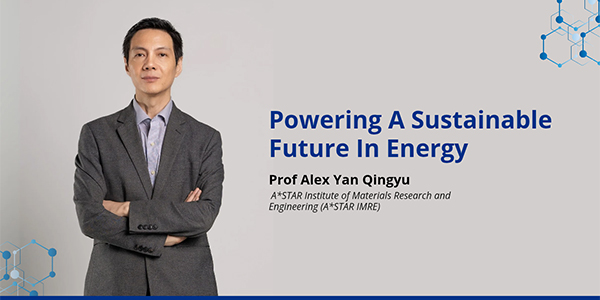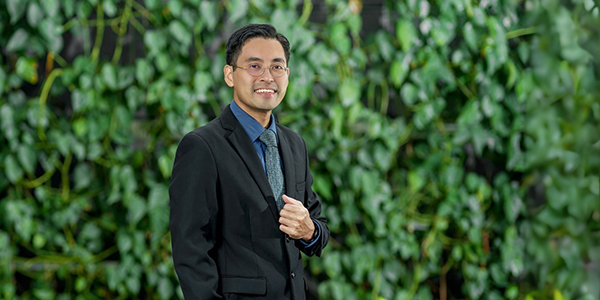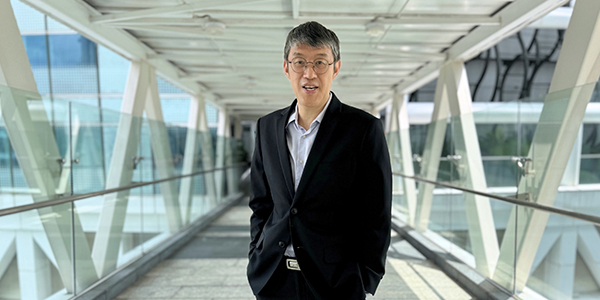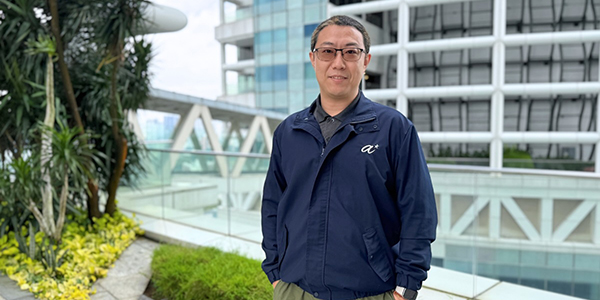Food for Thought: How a Nutritious Diet Can Influence Your Mood
 Prof Jeroen Schmitt, Senior Principal Investigator, Singapore Institute for Clinical Sciences, A*STAR
Prof Jeroen Schmitt, Senior Principal Investigator, Singapore Institute for Clinical Sciences, A*STAR
A renowned expert in brain health and nutrition, Prof Jeroen Schmitt has dedicated his career to understanding the relationship between nutrition and human health, especially in the areas of human brain functions, the human microbiome and clinical research that focuses on scientific validation of health benefits.
After completing his doctorate in Cognitive Psychopharmacology, Prof Schmitt investigated the role of serotonin in human cognitive processes and its impact on brain health.
Over the next 17 years, he honed his expertise in business management, holding key leadership positions at Nestlé Research in Switzerland. During this time, he guided his teams in fundamental and applied research for health benefits across all stages in life.
Drawn by the vibrant research ecosystem in Singapore, Prof Schmitt decided to pursue what remains close to his heart – research and development in brain health and nutrition, leading him to join A*STAR in 2021. He holds a primary appointment with A*STAR’s Singapore Institute for Clinical Sciences (SICS) and also a joint appointment with A*STAR’s Singapore Institute of Food and Biotechnology Innovation (SIFBI).
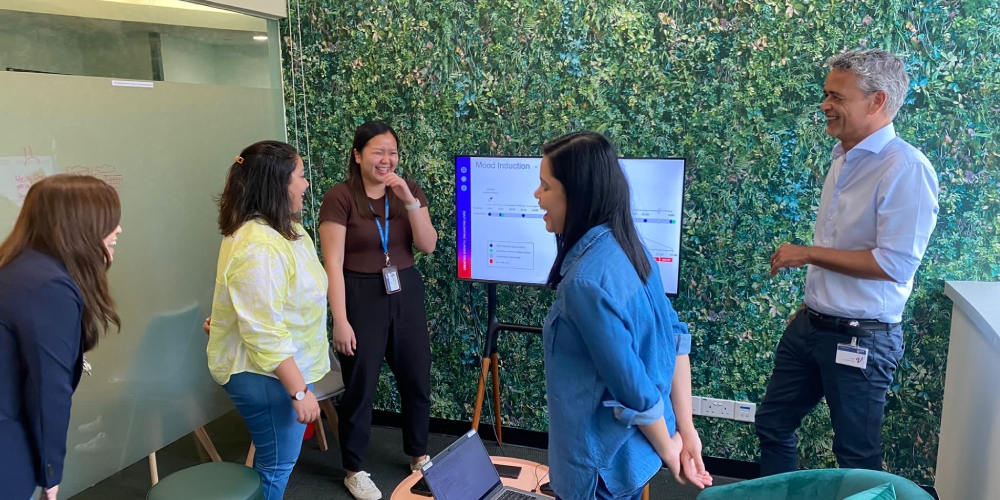 Prof Jeroen Schmitt (far right) having an engaging discussion on a new study design with his team.
Prof Jeroen Schmitt (far right) having an engaging discussion on a new study design with his team.
Armed with a wealth of experience and a passion to uncover new frontiers in brain health and nutrition, Prof Schmitt leads a dynamic team at A*STAR’s SICS to investigate the health effects of novel nutritional bioactives, which are compounds found in foods or drinks that can affect health, through clinical trials. The work includes uncovering innovative gut-brain interventions that can manage mood disturbances and stress. By creating digital mood biomarkers, which uses digital tools to track and assess a person’s emotional well-being, medical professionals can better identify patients at risks and tailor interventions to support their mental well-being.
With the aim of advancing healthcare through diet and brain health, his team works closely with other A*STAR entities, local research institutions, international organisations, and the scientific community and industry, and actively seeks out new partnerships to unlock synergistic opportunities. For instance, his team is working with Obviohealth on novel digital biomarkers, and NUS on biosensors and remote cognitive testing.
In this feature, Prof Schmitt shares about his personal journey and motivation to advancing brain health and interventions that can improve lives.
1) What inspired you to specialise in brain health and nutrition?
Our food intake impacts our overall health and well-being. While the effects of nutrition on metabolic and cardiovascular health are well-documented, the understanding of nutritional influences on the brain is still limited. When I began working in this field, I observed a wide range of nutrition products, supplements, and dietary advice targeted at enhancing brain function. However, I am cognisant of the need for rigorous scientific evidence to substantiate such claims. This has sparked my motivation to seek credible evidence regarding the effects of nutrition on brain function and other health benefits. My goal is to critically examine the effects of nutritional bioactives through rigorous research and scientific methods. Robust scientific evidence is essential to provide the public with accurate and reliable information.
To me, a healthy brain is one that enables an individual to have a fulfilling, productive, and enjoyable life, encompassing intellectual and emotional well-being.
2) What does it mean to have a “healthy brain”?
Health is not the absence of disease, and this applies to the brain. Even without psychiatric or neurological disorders, individuals can experience brain-related issues that impact their quality of life and functional capacity. These problems may develop into a persistent stress, depressed mood, developmental challenges, or cognitive decline with age.
 Prof Jeroen Schmitt and his family skiing in Switzerland
Prof Jeroen Schmitt and his family skiing in Switzerland
3) Personally, how do you keep your brain healthy? Do you have any tips to share regarding ageing well, perhaps foods that may improve brain health?
This may surprise you! I don’t take supplements, nor do I have a special diet. To me, having a healthy and balanced diet, coupled with finding the right balance between stimulation and rest is key for brain health. I consciously strive to maintain that balance and greatly enjoy intellectual challenges at work. However, at the end of the work day, my focus shifts to my family, hobbies and friends.
Many food and supplements, such as vitamins, omega-3 fatty acids, polyphenols, extracts, coffee, have been suggested to prevent cognitive decline during ageing. However, scientific evidence is often limited to cells, animals or associations in human observational studies. Long-term randomised clinical trials are challenging due to the gradual nature of ageing. Additionally, whole diets such as the Mediterranean diet or the Mediterranean- DASH Diet Intervention for Neurodegenerative Delay (MIND) diet, have shown promising results in preventing cognitive ageing. Overall, combining healthy eating with physical activity, mental stimulation, and social interactions is crucial for promoting brain health.
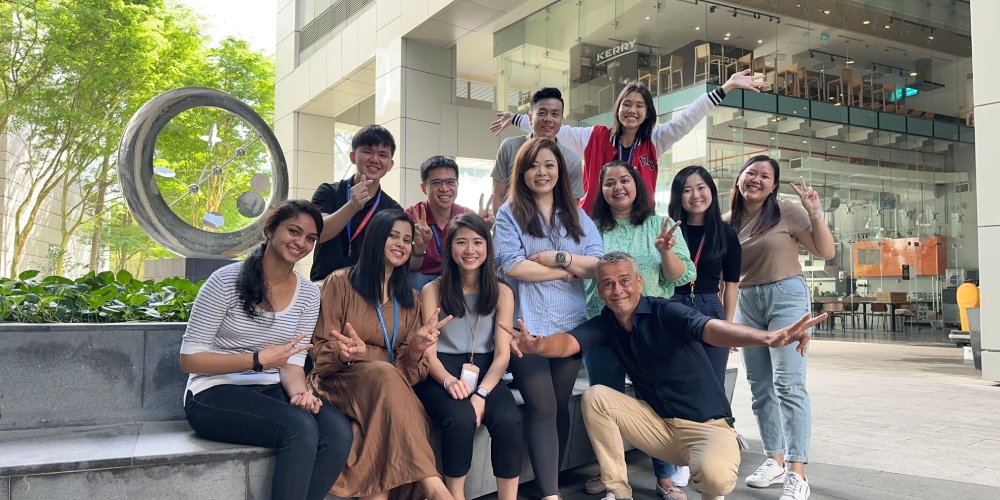 Prof Schmitt (front row in dark blue) with his team members from A*STAR’s SICS and SIFBI
Prof Schmitt (front row in dark blue) with his team members from A*STAR’s SICS and SIFBI
4) What keeps you motivated in your career?
I find great joy in working and engaging with people who come from diverse perspectives, backgrounds, and expertise. Collaborating with them to pursue the same goal greatly motivates me. I enjoy working with the younger generation, helping them grow and gaining experience and confidence.
I actively seek out new challenges and explore uncharted areas of research. The realisation that there is so much more exciting science to look forward to is very stimulating and motivating.
5) What is the most valuable life lesson from your career so far?
Step out of your comfort zone as this will provide you great rewards and foster personal and professional growth. Working in new environment, embracing unfamiliar terrain has enriched me both as an individual and professional. If you are guided by fear of the unknown, you may miss out on so many amazing experiences. My advice for someone keen to embark on research is to find yourself a stimulating and supportive work environment, a place where you can learn from your supervisors, mentors, be challenged and be allowed to make mistakes.
A*STAR celebrates International Women's Day

From groundbreaking discoveries to cutting-edge research, our researchers are empowering the next generation of female science, technology, engineering and mathematics (STEM) leaders.
Get inspired by our #WomeninSTEM

